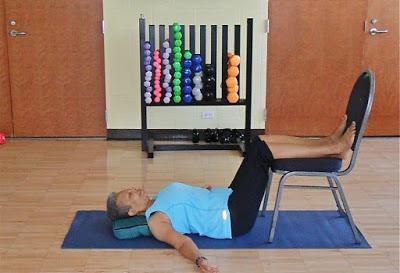
Beth's Closet
My name is Beth and I am a Perfectionist! Some of you may recognize yourself in this article but may not be ready to come out of the closet. And you know which closet I mean: that perfectly organized closet, coordinated by color; organized by tops, pants, jackets, dress clothes and by shoe type, all perfectly aligned. And for the sake of brevity, we will not discuss your linen closet or kitchen cabinets.Before I entered recovery, I spent years perfecting my Perfectionism to hide my ignorance of “Reality” and convince the world, and myself, that I was indeed “perfect.” And because I’m in recovery, I can share that ignorance/avidya, in which I go “pitta provoked” when folks do something I consider lame, dumb, or disorganized. First I fall headlong into anamayakosha aggravation—my shoulders shrug, my chest tightens, and my knees freeze. Then it’s straight into pranamayakosha pushback, where I suck up mass quantities of red earth energy from my first chakra, completely bypass the second chakra, and shove that fiery red anger into my third chakra, where it erupts into volcanic lava (I know you might not get the next few cultural references but you will get the idea). And it’s enough to make a sistah take off her earrings, put her hands on her hips, go into full head-neck roll, and progress into manomayakosha meltdown and scream, “OH NO YOU BETTA’ DON’T!” But, of course, that’s all internal. Remember, I’m a Perfectionist—gotta appear cool, calm, collected, and “large and in charge” to the world.That changed suddenly as I was wrestling with a long stretch of enforced inactivity after an emergency hysterectomy. The resting was hard. My life had been reduced to a standstill—a holding pattern—a lateral drift. Being forced to give up “doing” to experience “being” was a struggle. During that scary, restless time I often sat on the back deck of the house I lived in at the time. The view was peaceful: a pond, a state forest, and a huge weeping cherry tree. One day in early spring, the first pink blossom appeared on the drooping branches of that tree and I watched it with focused fascination. Over the next few days it bloomed in all of its ordinary magic. As that bud blossomed, something inside me blossomed as well. An insight emerged full-blown from the depths of somewhere into my conscious mind. A thought popped, "There is another way to live and I have got to find it." At that moment, my recovery from Perfectionism began.What is Perfectionism?First I needed an answer to the question, “What is Perfectionism?” I considered this question first from the allopathic perspective: is Perfectionism a disease or a mental disorder? The answer is that Perfectionism is a multidimensional personality characteristic that has both positive and negative effects. In terms of negative effects, a Google search turned up some really disturbing side effects for Perfectionism that goes too far:
- Depression
- Anxiety
- Panic attacks
- Eating Disorders (whew, that’s one I never had to worry about)
- Obsessive Compulsive Disorder (uh oh—remember the closets?)
- Thoughts of suicide. Research says that perfectionists are more likely to kill themselves than regular, mediocre-performing people.
- Workaholism (hmmmm, sound familiar?)
- Low self-esteem (sigh—yeah, that’s a factor for sure)
- Chronic stress (maybe that’s the source of the bald spots, skin rashes and constipation?)
- Heart disease
- Substance abuse (I wonder if chocolate counts?)
But the side effects of Perfectomayacin would need to be considered. There are side effects to all drugs. They come right along with the fix. TV commercials, filled with smiling bubbly, happy people running through grassy fields, walking hand in hand, or playing with puppies would first extol the benefits of Perfectomayacin and then follow up with the side effects which might include the following:
- Do not take Perfectomayacin if you are pregnant or thinking about becoming pregnant.
- If taking Perfectomayacin, do not eat sweets or drink alcohol (What?! Dessert is my favorite food group!).
- Drowsiness, dizziness, nasal irritation, insomnia, nausea and projectile vomiting (boy, that would destroy my image at a business meeting).
A Yogic Perspective
So with no quick fix in sight, I looked at Perfectionism from the yogic perspective. I recognized the symptoms of anamayakosha aggravation, pranamayakosha pushback, and the manomayakosha meltdown. So I then explored the kleshas. I found that my perfectionist behaviors reflect ALL of the kleshas. Let’s go through them one by one:
Avidya/Not seeing things as they are: Clearly I do not see things as they are if I think for one minute I’m superior to others—and I sometimes do! I’m in recovery; it’s a process.
Asmita/Ego: I see something lame, dumb or disorganized (my opinion), and I want to say, “I know what your problem is, I have time to tell you about it and can give you a complete list of all the things you need to do to fix yourself.”
Raga/Attachment: I’ll dot every “i” and cross every “t” because it’s got to be perfect! But it’s never perfect (to my standards), and the emotional spiral of deflation, anger,and guilt kicks in, followed by my grand defense mechanism: the blame game. It’s someone else’s fault (this one sucks wind big-time!)
Dvesha/Avoidance/Unreasonable Dislikes: I don’t like other Perfectionists because they think they’re better than me. And, OMG, they just might be!
Abinivesha/Fear: If they really knew me, they’d know I’m a fake. Then they wouldn’t like me and that could increase the intensity of side effects like depression, anxiety, panic attacks and projectile vomiting (sigh).
So, when my discomfort and angst reached their limit, I designed for myself a yoga therapy program for Perfectionism. Here’s a sample:
- Grounding postures like Downward-Facing Dog pose, Child’s Pose and Legs Up the Chair Pose (Easy Inverted Pose) calm anamayakosha aggravation.
- Cooling breaths like Kaki Breath and Relaxation Breathing calm pranamayakosha pushback.
- Mudras like Adhi Mudra and Chinmaya are grounding and reduce the incidence of manomayakosha meltdown.

Calming Anamayakosha Aggravation
Yoga Therapy for PerfectionismWith a heavy dose of tapas, I plunged into the full application of yoga therapy and over time discovered that the energetic intensity of my Perfectionism decreased. My kleshas shifted and I discovered the happy side effects of yoga therapy for Perfectionism:Avidya/Not seeing things as they are: My ignorance reduced from 100% to about 55 – 60%, and I see more clearly that I’m not superior to everyone else (only to a few members of my family; a couple of friends, and colleagues—remember, I’m in recovery, so it’s a process).
Asmita/Ego: With practice, I reduced the incidents of my manomayakosha meltdowns and I don’t give advice unless I’m asked for it (most of the time).
Raga/Attachment: According to Sri Swami Pratyagbodhananda, (a very wise man) all outcomes to any actions will be either 1) expected, 2) more than expected, 3) less than expected, or 4) unexpected. I now realize that I can influence outcomes but I do not control them (still getting used to that one!).
Dvesha/Avoidance/Unreasonable Dislikes: Everyone has a part to play so I’m OK and you’re OK (Well mostly OK except for a few members of my family; a couple of friends and colleagues—remember, I’m in recovery, so it’s a process).
Abinivesha/ Fear: A thank you to Sen. Al Franken and his movie “Stuart Saves His Family.” Regarding fear, Stuart says, “Let’s face it, trace it, erase it.” And yoga therapy would add, “replace it with a Bhavana like his, “I’m good enough, I’m smart enough and, doggone it, people like me!” (and I’m perfectly OK if they don’t).



posted on 10 September at 07:33
nice info about yoga theraphy is shared above know about our http://sunrisenaturopathy.com/Water-Park.html http://sunrisenaturopathy.com http://www.sunriseayurvadic.com/ http://www.allrajasthan.com http://www.allrajasthan.com/2015/02/best-seo-training-institute-in-jaipur.html http://sunrisenaturopathy.com/Health-Spa.html http://www.sunriseayurvadic.com/shirodhara.html http://www.sunriseayurvadic.com/Panchakarma.html http://www.sunrisenaturopathy.com/Yoga-Meditation.html packages were created for patients looking to achieve maximum beauty and restore their youthful appearance.